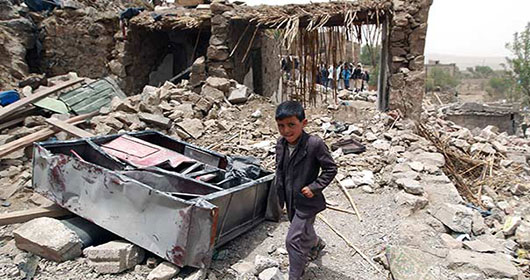
UN: KSA Strikes Cause Great Amount of Destruction in Yemen
Local Editor
UN High Commissioner for Human Rights Zeid Ra’ad al-Hussein said that the Saudi-led bombing campaign in Yemen is to blame for a disproportionate number of civilian deaths and the destruction of infrastructure in the conflict, urging the UN Security Council to step up ceasefire efforts.
He addressed the 15-member body saying that: "Failure to act decisively does not only spell misery for the millions of vulnerable people in Yemen today. It would inevitably push the country into an irreversible process of Balkanization, the consequences of which would lie outside of anyone’s control."
Meanwhile, the need to establish a long-lasting ceasefire is vital as instability on the ground creates a breeding ground for terrorists who not only threaten Yemen, but the entire region as a whole.
"
The potential ramifications of a failed state in Yemen would almost inevitably create safe havens for radical and confessional groups such as the so-called "ISIS". This, in turn, could expand the conflict beyond Yemen’s borders, potentially shattering regional stability," al-Hussein added.
For its part, the UN Security Council [UNSC] met following the collapse of Sunday’s UN-sponsored peace talks on Yemen in Switzerland. While negotiations are scheduled to reconvene on January 14, fighting on the ground continues despite a fragile ceasefire agreement supposed to be in place until at least December 28.
The UN estimated that the violence resulted in a dramatic increase in civilian casualties, with over 600 children killed and more than 900 seriously injured. That is five times more than in 2014.
In all, the UN believed the conflict has killed at least 2,700 people since March, when Saudi-led airstrikes began. The collateral damage from Saudi strikes has seen a drastic rise in civilian deaths.
Another deadly side effect of the ongoing violence is the humanitarian situation that is so dire that over 80% of Yemen’s population is heavily reliant on international aid, which at times is impossible to deliver.
In a related context, UN Assistant Secretary-General for Humanitarian Affairs Kyung-wha Kang said in her briefing to the Council, that some 7.6 million require emergency food aid to survive. At least two million are now malnourished, including 320,000 children suffering from severe malnutrition. That is a two-fold increase since March.
Overall, more than 14 million people lack access to healthcare with continued airstrikes leaving some 2.5 million people internally displaced. That is an eight-fold increase since the start of the conflict.
In parallel, human rights watchdogs also accused the Saudi-led coalition of the careless aerial bombing of civilian targets.
